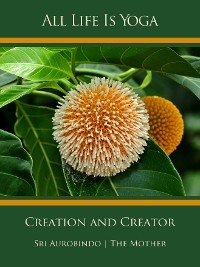
Полная версия
All Life Is Yoga: The Sunlit Way of Yoga
* * *
Control Your Impulses
From the time you are quite young, the work of your educators is to teach you to control your impulses and obey only those which are in conformity with the laws under which you live or with the ideal you wish to follow or the customs of the environment in which you are. The value of this mental construction which will govern your impulses depends a great deal on the surroundings in which you live and the character of the parents or people who educate you. But whether it be good or bad, mediocre or excellent, it is always the result of a mental control over the impulses. When your parents tell you, “You should not do this”, or when they say, “You have to do that”, this is a beginning of education for the mind’s control over the impulses.
* * *
Reason Must Be the Master
It is a good thing to begin to learn at an early age that to lead an efficient life and obtain from one’s body the maximum it is able to give, reason must be the master of the house. And it is not a question of yoga or higher realisation, it is something which should be taught everywhere, in every school, every family, every home: man was made to be a mental being, and merely to be a man – we are not speaking of anything else, we are speaking only of being a man – life must be dominated by reason and not by vital impulses. This should be taught to all children from their infancy.... The first thing which should be taught to every human being as soon as he is able to think, is that he should obey reason which is a super-instinct of the species. Reason is the master of the nature of mankind. One must obey reason and absolutely refuse to be the slave of instincts. And here I am not talking to you about yoga, I am not talking about spiritual life, not at all; it has nothing to do with that. It is the basic wisdom of human life, purely human life: every human being who obeys anything other than reason is a kind of brute lower than the animal. That’s all. And this should be taught everywhere; it is the basic education which should be given to children.
The reign of reason must come to an end only with the advent of the psychic law which manifests the divine Will.
* * *
Reason Is Developed by Using It
How can the reason be developed?
Oh! By using it. Reason is developed like the muscles, like the will. All these things are developed by a rational use. Reason! everyone possesses reason, only he doesn’t make use of it. Some people are very much afraid of reason because it contradicts their impulses. So they prefer not to listen to it. Then, naturally, if one makes it a habit not to listen to reason, instead of developing, it loses its light more and more.
To develop reason you must want to do it sincerely; if on one side you tell yourself, “I want to develop my reason”, and on the other you don’t listen to what the reason tells you to do, then you never come to anything, because naturally, if each time it tells you, “Don’t do this” or “Do this”, you do the opposite, it will lose the habit of saying anything at all.
* * *
Education: Preparing the Consciousness
Usually all education, all culture, all refinement of the senses and the being is one of the best ways of curing instincts, desires, passions. To eliminate these things does not cure them; to cultivate, intellectualise, refine them, this is the surest means of curing. To give the greatest possible development for progress and growth, to acquire a certain sense of harmony and exactness of perception, this is a part of the culture of the being, of the education of the being....
Education is certainly one of the best means of preparing the consciousness for a higher development. There are people with very crude and very simple natures, who can have great aspiration and attain a certain spiritual development, but the base will always be of an inferior quality, and as soon as they return to their ordinary consciousness they will find obstacles in it, because the stuff is too thin, there are not enough elements in their vital and material consciousness to enable them to bear the descent of a higher force.
* * *
A Child’s Desires
Sweet Mother, how can we help a child to come out of this habit of always asking?
There are many ways. But first of all you must know whether you will not just stop him from freely expressing what he thinks and feels. Because this is what people usually do. They scold, even sometimes punish him; and so the child forms the habit of concealing his desires. But he is not cured of them. And you see, if he is always told, “No, you won’t have that”, then, simply, this state of mind gets settled in him: “Ah, when you are small, people don’t give you anything! You must wait till you are big. When I am big I shall have all that I want.” That’s how it is. But this does not cure them. It is very difficult to bring up a child. There is a way which consists in giving him all he wants; and naturally, the next minute he will want something else, because that’s the law, the law of desire: never to be satisfied. And so, if he is intelligent, one can tell him, “But you see, you insisted so much on having this and now you no longer care for it. You want something else.” Yet if he was very clever he would answer, “Well, the best way of curing me is to give me what I ask for.”
Some people cherish this idea all their life. When they are told that they should overcome their desires, they say, “The easiest way is to satisfy them.” This kind of logic seems impeccable. But the fact is that it is not the object desired that has to be changed, it is the impulse of desire, the movement of desire. And for this a great deal of knowledge is needed, and this is difficult for a very young child....
In fact, perhaps one should begin by shifting the movement to things which it is better to have from the true point of view, and which it is more difficult to obtain. If one could turn this impulsion of desire towards a... For example, when a child is full of desires, if one could give him a desire of a higher kind – instead of its being a desire for purely material objects, you understand, an altogether transitory satisfaction – if one could awaken in him the desire to know, the desire to learn, the desire to become a remarkable person... in this way, begin with that. As these things are difficult to do, so, gradually, he will develop his will for these things. Or even, from the material point of view, the desire to do something difficult, as for example, construct a toy which it is difficult to make – or give him a game of patience which requires a great deal of perseverance.
If one can orient them – it requires much discernment, much patience, but it can be done – and if one can orient them towards something like this, to succeed in very difficult games or to work out something which requires much care and attention, and can push them in some line like this so that it exercises a persevering will in them, then this can have results: tum their attention away from certain things and towards others. This needs constant care and it seems to be a way that’s most – I can’t say the easiest, for it is certainly not easy – but the most effective way.
* * *
True Need and Desire
It is very difficult to find the borderland between a true need and a desire.... And there we really face a problem which compels an extraordinary sincerity, for the very first way in which the vital meets life is through desire – and yet, there are necessities. But how to know if things are really necessary, not desired?... For that you must observe yourself very, very attentively, and if there is anything in you which produces something like a small intense vibration, then you may be sure that there lies a desire. For example, you say, “This food is necessary for me” – you believe, you imagine, you think that you need such and such a thing and you find the necessary means to obtain the thing. To know if it is a need or a desire, you must look at yourself very closely and ask yourself, “What will happen if I cannot get the thing?” Then if the immediate answer is, “Oh, it will be very bad”, you may be sure that it is a matter of desire. It is the same for everything. For every problem you draw back, look at yourself and ask, “Let us see, am I going to have the thing?” If at that moment something in you jumps tip with joy, you may be certain there is a desire. On the other hand, if something tells you, “Oh, I am not going to get it”, and you feel very depressed, then again it is a desire.
* * *
Give up Desire
The Buddha has said that there is a greater joy in overcoming a desire than in satisfying it. It is an experience everybody can have and one that is truly very interesting, very interesting....
There is a kind of inner communion with the psychic being which takes place when one willingly gives up a desire, and because of this one feels a much greater joy than if he had satisfied his desire. Besides, most usually, almost without exception, when one satisfies a desire it always leaves a kind of bitter taste somewhere.
There is not one satisfied desire which does not give a kind of bitterness; as when one has eaten too sugary a sweet it fills your mouth with bitterness. It is like that. You must try sincerely. Naturally you must not pretend to give up desire and keep it in a comer, because then one becomes very unhappy. You must do it sincerely.
* * *
Win Your Little Victories
If through an effort of inner consciousness and knowledge, you can truly overcome in yourself a desire, that is to say, dissolve and abolish it, and if through inner goodwill, through consciousness, light, knowledge, you are able to dissolve the desire, you will be, first of all in yourself personally, a hundred times happier than if you had satisfied this desire, and then it will have a marvellous effect. It will have a repercussion in the world of which you have no idea. It will spread forth. For the vibrations you have created will continue to spread. These things grow larger like the snow-ball. The victory you win in your character, however small it be, is one which can be gained in the whole world....
If you really want to do something good, the best thing you can do is to win your small victories in all sincerity, one after another, and thus you will do for the world the maximum you are able to.
* * *
Change Yourself First
You can do nothing for others unless you are able to do it for yourself. You can never give a good advice to anyone unless you are able to give it to yourself first, and to follow it. And if you see a difficulty somewhere, the best way of changing this difficulty is to change it in yourself first. If you see a defect in anyone, you may be sure it is in you, and you begin to change it in yourself. And when you will have changed it in yourself, you will be strong enough to change it in others. And this is a wonderful thing. People don’t realise what an infinite grace it is that this universe is arranged in such a way that there is a collection of substance, from the most material to the highest spiritual, all that gathered together into what is called a small individual, but at the disposal of a central Will. And that is yours, your field of work, nobody can take it away from you, it is your own property. And to the extent you can work upon it, you will be able to have an action upon the world. But only to that extent. One must do more for oneself, besides, than one does for others.
* * *
Chapter 3
Morality, Religion, Yoga
Spirituality and Morality
[There is a] great difference between spirituality and morality, two things that are constantly confused with each other. The spiritual life, the life of Yoga, has for its object to grow into the divine consciousness and for its result to purify, intensify, glorify and perfect what is in you. It makes you a power for manifesting the Divine; it raises the character of each personality to its full value and brings it to its maximum expression; for this is part of the Divine plan. Morality proceeds by a mental construction and, with a few ideas of what is good and what is not, sets up an ideal type into which all must force themselves. This moral ideal differs in its constituents and its ensemble at different times and different places. And yet it proclaims itself as a unique type, a categoric absolute; it admits of none other outside itself; it does not even admit a variation within itself. All are to be moulded according to its single ideal pattern, everybody is to be made uniformly and faultlessly the same. It is because morality is of this rigid unreal nature that it is in its principle and its working the contrary of the spiritual life. The spiritual life reveals the one essence in all, but reveals too its infinite diversity; it works for diversity in oneness and for perfection in that diversity. Morality lifts up one artificial standard contrary to the variety of life and the freedom of the spirit. Creating something mental, fixed and limited, it asks all to conform to it. All must labour to acquire the same qualities and the same ideal nature. Morality is not divine or of the Divine; it is of man and human. Morality takes for its basic element a fixed division into the good and the bad; but this is an arbitrary notion. It takes things that are relative and tries to impose them as absolutes; for this good and this bad differ in differing climates and times, epochs and countries. The moral notion goes so far as to say that there are good desires and bad desires and calls on you to accept the one and reject the other. But the spiritual life demands that you should reject desire altogether. Its law is that you must cast aside all movements that draw you away from the Divine. You must reject them, not because they are bad in themselves, – for they may be good for another man or in another sphere, – but because they belong to the impulses or forces that, being unillumined and ignorant, stand in the way of your approach to the Divine. All desires, whether good or bad, come within this description; for desire itself arises from an unillumined vital being and its ignorance. On the other hand you must accept all movements that bring you into contact with the Divine. But you accept them, not because they are good in themselves, but because they bring you to the Divine. Accept then all that takes you to the Divine. Reject all that takes you away from it, but do not say that this is good and that is bad or try to impose your outlook on others; for, what you term bad may be the very thing that is good for your neighbour who is not trying to realise the Divine Life.
* * *
Hasn’t Morality Helped?
Sweet Mother, hasn’t morality helped us to increase our consciousness?
That depends on people. There are people who are helped by it, there are people who are not helped at all.
Morality is something altogether artificial and arbitrary, and in most cases, among the best, it checks the true spiritual effort by a sort of moral satisfaction that one is on the right path and a true gentleman, that one does one’s duty, fulfils all the moral requirements of life. Then one is so self-satisfied that one no longer moves or makes any progress.
It is very difficult for a virtuous man to enter the path of God; this has been said very often, but it is altogether true, for he is most self-satisfied, he thinks he has realised what he ought to have realised, he no longer has either the aspiration or even that elementary humility which makes one want to progress. You see, one who is known here as a sattwic man is usually very comfortably settled in his own virtue and never thinks of coming out of it. So, that puts you a million leagues away from the divine realisation.
What really helps, until one has found the inner light, is to make for oneself a certain number of rules which naturally should not be too rigid and fixed, but yet should be precise enough to prevent one from going completely out of the right path or making irreparable mistakes – mistakes the consequences of which one suffers all one’s life.
To do that, it is good to set up a certain number of principles in oneself, which, however, should be for each one, in conformity with his own nature. If you adopt a social, collective rule, you immediately make yourself a slave to this social rule, and that prevents you almost radically from making any effort for transformation.
* * *
Serving Humanity
Why do you want to serve humanity, what is your idea? It is ambition, it is in order to become a great man among men. It is difficult to understand?... I can see that!
The Divine is everywhere. So if one serves humanity, one serves the Divine, isn’t that so?
That’s marvellous! The clearest thing in this business is to say: “The Divine is in me. If I serve myself, I am also serving the Divine!” (Laughter) In fact, the Divine is everywhere. The Divine will do His own work very well without you.
I see quite well that you do not understand. But truly, if you do understand that the Divine is there, in all things, with what are you meddling in serving humanity? To serve humanity you must know better than the Divine what must be done for it. Do you know better than the Divine how to serve it?
The Divine is everywhere. Yes. Things don’t seem to be Divine.... As for me, I see only one solution: if you want to help humanity, there is only one thing to do, it is to take yourself as completely as possible and offer yourself to the Divine. That is the solution. Because in this way, at least the material reality which you represent will be able to grow a little more like the Divine.
We are told that the Divine is in all things. Why don’t things change? Because the Divine does not get a response, everything does not respond to the Divine. One must search the depths of the consciousness to see this. What do you want to do to serve humanity? Give food to the poor? – You can feed millions of them. That will not be a solution, this problem will remain the same. Give new and better living conditions to men? –The Divine is in them, how is it that things don’t change? The Divine must know better than you the conditions of humanity. What are you? You represent only a little bit of consciousness and a little bit of matter, it is that you call “myself’. If you want to help humanity, the world or the universe, the only thing to do is to give that little bit entirely to the Divine. Why is the world not divine?... It is evident that the world is not in order. So the only solution to the problem is to give what belongs to you. Give it totally, entirely to the Divine; not only for yourself but for humanity, for the universe. There is no better solution. How do you want to help humanity? You don’t even know what it needs. Perhaps you know still less what power you are serving. How can you change anything without indeed having changed yourself?
In any case, you are not powerful enough to do it. How do you expect to help another if you do not have a higher consciousness than he? It is such a childish idea! It is children who say: “I am opening a boarding-house, I am going to build a crèche, give soup to the poor, preach this knowledge, spread this religion....” It is only because you consider yourself better than others, think you know better than they what they should be or do. That’s what it is, serving humanity. You want to continue all that? It has not changed things much. It is not to help humanity that one opens a hospital or a school....
You may open millions of hospitals, that will not prevent people getting ill. On the contrary, they will have every facility and encouragement to fall ill. We are steeped in ideas of this kind. This puts your conscience at rest: “I have come to the world. I must help others.” One tells oneself: “How disinterested I am! I am going to help humanity.” All this is nothing but egoism.
In fact, the first human being that concerns you is yourself. You want to diminish suffering, but unless you can change the capacity of suffering into a certitude of being happy, the world will not change. It will always be the same, we tum in a circle – one civilisation follows another, one catastrophe another; but the thing does not change, for there is something missing, something not there, that is the consciousness. That’s all.
* * *
Religion
Religion belongs to the higher mind of humanity. It is the effort of man’s higher mind to approach, as far as lies in its power, something beyond it, something to which humanity gives the name God or Spirit or Truth or Faith or Knowledge or the Infinite, some kind of Absolute, which the human mind cannot reach and yet tries to reach. Religion may be divine in its ultimate origin; in its actual nature it is not divine but human. In truth we should speak rather of religions than of religion; for the religions made by man are many....
The first and principal article of these established and formal religions runs always, “Mine is the supreme, the only truth, all others are in falsehood or inferior.” For without this fundamental dogma, established credal religions could not have existed. If you do not believe and proclaim that you alone possess the one or the highest truth, you will not be able to impress people and make them flock to you.
This attitude is natural to the religious mind; but it is just that which makes religion stand in the way of the spiritual life. The articles and dogmas of a religion are mind-made things and, if you cling to them and shut yourself up in a code of life made out for you, you do not know and cannot know the truth of the Spirit that lies beyond all codes and dogmas, wide and large and free. When you stop at a religious creed and tie yourself in it, taking it for the only truth in the world, you stop the advance and widening of your inner soul. But if you look at religion from another angle, it need not always be an obstacle to all men. If you regard it as one of the higher activities of humanity and if you can see in it the aspirations of man without ignoring the imperfection of all man-made things, it may well be a kind of help for you to approach the spiritual life. Taking it up in a serious and earnest spirit, you can try to find out what truth is there, what aspiration lies hidden in it, what divine inspiration has undergone transformation and deformation here by the human mind and a human organisation, and with an appropriate mental stand you can get religion even as it is to throw some light on your way and to lend some support to your spiritual endeavour.
* * *
Yoga and Religion
Sweet Mother, what is the difference between yoga and religion?
Ah! my child... it is as though you were asking me the difference between a dog and a cat!
(Long silence)
Imagine someone who, in some way or other, has heard of something like the Divine or has a personal feeling that something of the kind exists, and begins to make all sorts of efforts: efforts of will, of discipline, efforts of concentration, all sorts of efforts to find the Divine, to discover what He is, to become acquainted with Him and unite with Him. Then this person is doing yoga.
Now, if this person has noted down all the processes he has used and constructs a fixed system, and sets up all that he has discovered as absolute laws – for example, he says: the Divine is like this, to find the Divine you must do this, make this particular gesture, take this attitude, perform this ceremony, and you must admit that this is the truth, you must say, “I accept that this is the Truth and I fully adhere to it; and your method is the only right one, the only one which exists” – if all that is written down, organised, arranged into fixed laws and ceremonies, it becomes a religion.









